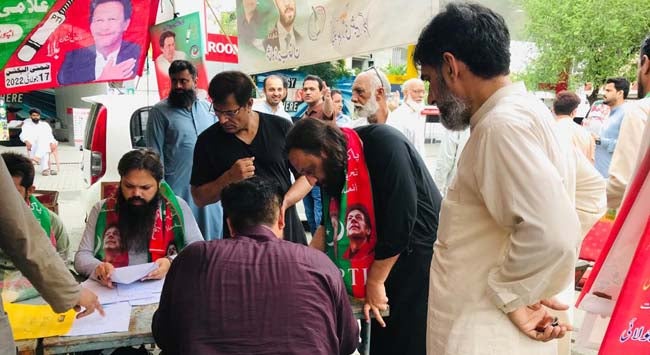Summary
The Punjab by-elections of 17 July 2022 could fundamentally shape the trajectory of national and regional politics in Pakistan. This paper analyses the results and assesses their potential political and economic impact.
The by-elections held in Punjab, Pakistan, on 17 July 2022 could dramatically impact the country’s national and regional political landscape. Imran Khan’s Pakistan Tehreek-e-Insaf (PTI) won 15 of the 20 seats up for grabs. With 188 seats in the Punjab assembly, the PTI and its allies now have a majority in Pakistan’s most important province, politically and economically. The scale of the PTI’s victory comes as a shock for Prime Minister Shehbaz Sharif’s Pakistan Muslim League-Nawaz (PML-N), which has long seen Punjab as its bastion. Sharif himself was a popular former chief minister who acquired a reputation for being a good administrator.
These by-elections were a straight-up battle between the PTI and PML-N. The results reflect the success of Khan’s concerted efforts to solidify his support base since being ousted from power in April 2022 through a no-confidence motion. Khan and the PTI have been mobilising their supporters through mass jalsas (rallies), press conferences and the use of social media. Through these, they have blamed corrupt politicians for all the ills of Pakistan’s economy and reiterated the claim that there was a foreign conspiracy behind Khan’s ouster. Such messaging, interlaced with populism and an appeal to religious symbolism, has won Khan and the PTI support amongst sections of the youth and middle class. While we await further details on the vote share, it is fair to surmise that these groups were important in ensuring the PTI’s victories in the cities.
It is equally important to note that the PTI candidates won in constituencies in rural southern Punjab. Feudal leaders and landlords, known as the “electables”, have dominated the political landscape here. These electables have generally been associated with parties like the PML-N. The PTI’s attempts to win over the electables notwithstanding, the results of the by-election may signal the emergence of new political dynamics. The fragmentation of landholdings that weakens the position of the landlords, coupled with the PTI’s support amongst the youth, may be reshaping voting behaviour in the rural areas.
It is clear that economic distress linked to escalating inflation worked against the PML-N. To be sure, the PML-N inherited an economy in serious distress and has little option but to ensure that Pakistan receives the next tranche of a loan from the International Monetary Fund (IMF). The IMF, however, requires Pakistan to end fuel subsidies, increase its tax base and generate more revenue. Even though the IMF deal had been originally agreed to by Khan’s government in 2019, it had not implemented the contingent structural reforms. This resulted in the credit facility being stalled. To ensure that Pakistan receives a further US$1.17 billion (S$1.63 billion) from the IMF, Sharif has had to take highly unpopular decisions like eliminating fuel subsidies. In the lead-up to the elections, there was a perceptible sense of discontentment amongst the population as rising fuel prices compounded the inflation crisis.
Given that such economic steps have had political repercussions in the PML-N’s traditional stronghold, the government may be hesitant to push through more economic reforms until after a general election. As Khan doubles down on his populist political platform, it is unlikely that substantial attempts will be made to usher in the structural changes that the economy needs. Thus, the results of the by-elections may portend further economic uncertainty. Such concerns resulted in the stock market plunging by more than 700 points in the wake of the by-elections.
On its part, the PML-N may take some respite from the fact that this loss could, to some measure, also be attributed to internal rifts. In a bid to nullify Khan’s appeal, the party had allocated seats to PTI turncoats. This strategy seems to have backfired as it upset some PML-N members who refused to lobby for the party’s candidates.
Looking ahead, the by-elections may influence the trajectory of national and regional politics in the coming months. Riding on the wave of these victories, Khan and the PTI will no doubt push for swift elections. However, Sharif’s government will be looking to provide some form of economic relief before calling for elections. However, their hand is weaker now. At the centre, their dominant position and negotiating power within the ruling coalition, which includes rivals like the Pakistan Peoples Party, has been somewhat dented. At a regional level, the fact that the PTI holds power in two of the four provinces of Pakistan may enable it to trigger an election by dissolving the regional assemblies. This would, however, be contingent on the PTI coming to an agreement with its regional allies and entail complex political negotiations. Particularly important in this regard would be the Pakistan Muslim League-Quad (PML-Q), whose leader, Parvez Elahi, will be the next chief minister of Punjab. The PML-Q, which is a crucial ally of the PTI in Punjab, is close to the military. Thus, the political negotiations, which will take place in the coming weeks, could even serve to normalise the relations between Khan and the politically influential military that were strained in the last year of his prime minister tenure and contributed to his ouster.
. . . . .
Associate Professor Iqbal Singh Sevea is Director at the Institute of South Asian Studies (ISAS), an autonomous research institute at the National University of Singapore (NUS). He can be contacted at isasiss@nus.edu.sg. The author bears full responsibility for the facts cited and opinions expressed in this paper.
Pic Credit: PTI’s Twitter
-
 More From :
More From :
-
 Tags :
Tags :
-
 Download PDF
Download PDF



